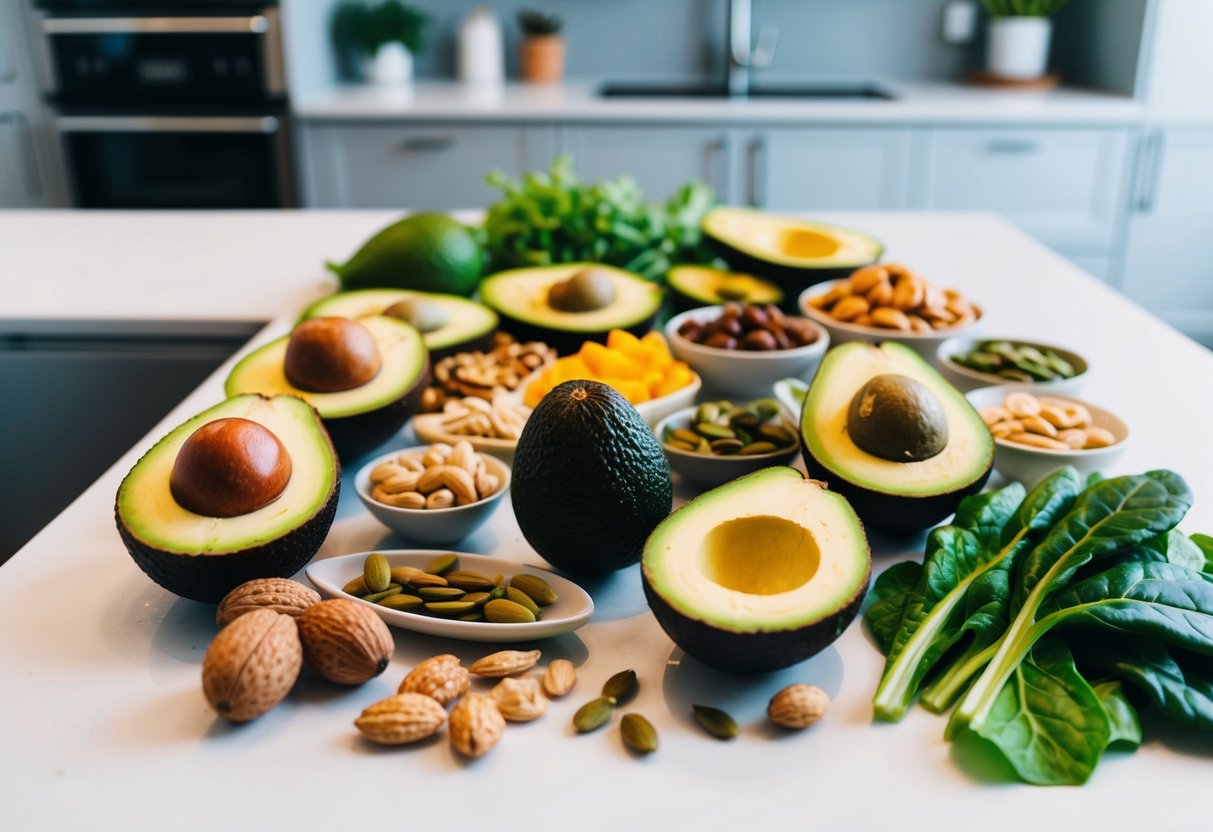Keto and Constipation: Understanding Causes, Effective Remedies, and Prevention Tips
This post may contain affiliate links. If you purchase through these links, I may earn a small commission at no extra cost to you. LEARN MORE.
Starting a keto diet can be a big change for your body and might lead to some unwanted effects like constipation.
This happens when the body adjusts to the high-fat, low-carb regimen of keto, which might disrupt normal digestion processes.
Adding fiber-rich foods such as leafy greens, nuts, and seeds, along with staying well-hydrated, are key strategies to combat and prevent constipation.

It’s crucial to understand why these changes occur.
Reducing carb intake can decrease dietary fiber, which the body needs for healthy digestion.
Without enough fiber and fluids, it’s challenging for waste to pass smoothly through the digestive tract, leading to constipation.
Keeping active and gradually shifting to the diet can ease the transition.
Knowing the right remedies can help ease discomfort and support digestive health.
Simple solutions include increasing water intake and incorporating more fiber into meals.
One can also consider adjusting fat intake or exercise routines to improve digestive flow.
Check out our guide about keto mistakes that trigger digestive issues.
Key Takeaways
- The keto diet may cause constipation due to changes in fiber intake.
- Staying hydrated and adding high-fiber foods can relieve symptoms.
- Gradual changes in diet and increased activity help prevent constipation.
Understanding Keto and Constipation

The ketogenic diet, known for its low-carbohydrate and high-fat approach, can often lead to digestive issues like constipation.
This happens due to dietary changes impacting bowel movements and digestive processes.
What Is Constipation?
Constipation refers to infrequent or difficult bowel movements.
For those on a ketogenic diet, it can mean less than three bowel movements a week.
Common signs include hard stools, straining during bowel movements, and a feeling of incomplete evacuation.
Causes can be several, including not drinking enough water, lacking fiber, or changes in routine.
Normal digestion relies on a balance of fluids, fiber, and a regular eating schedule, all of which can be altered when adopting a keto lifestyle.
How the Ketogenic Diet Affects Digestion
The ketogenic diet emphasizes high fat and low carbohydrates, leading to ketosis.
This shift might alter digestion, causing constipation.
Reducing carb intake often means less dietary fiber, essential for regular bowel movements.
The increased fat intake requires a period of adjustment for the digestive system.
Some people experience slower digestion initially, making bowel movements less frequent.
Electrolyte imbalances can also play a role, affecting how food moves through the digestive tract.
Looking for some electrolytes? See our top pick from Amazon below
Common Digestive Changes During Ketosis
Upon entering ketosis, the body makes ketone bodies as a fuel source, which can lead to digestive changes.
For many, bowel movements become irregular.
Some might experience a delay as the body adjusts.
Others even note bouts of diarrhea or hard stools.
It’s essential to monitor bowel habits and make dietary adjustments as needed, such as increasing water intake or choosing fiber-rich, low-carb foods like leafy greens.
Maintaining a balance can help manage any initial digestive discomforts.
Primary Causes of Constipation When Starting Keto

Starting a keto diet can often lead to constipation due to changes in diet and body adjustment.
Key factors include reduced fiber intake from fewer carbohydrates, lower water intake leading to dehydration, and an imbalance in electrolytes caused by the keto flu.
Reduced Fiber Intake and Carbohydrate Restriction
When someone begins the keto diet, they greatly reduce their carbohydrate intake.
This can result in getting less fiber since many high-fiber foods like grains and fruits are limited.
Fiber is crucial for healthy digestion, helping to add bulk to stools and promote regular bowel movements.
Fiber supplements such as psyllium husk can help provide the needed fiber.
Additionally, low-carb, high-fiber vegetables, such as leafy greens or seeds, should be included to maintain some fiber intake.
See our article and find out the difference in fiber sources between clean and dirty keto.
Dehydration and Water Intake
Lower carb diets like keto cause the body to expel more water, which can lead to dehydration.
With dehydration, there is not enough fluid to keep stools soft, which makes them harder to pass.
Drinking more water is essential.
To ensure proper hydration, individuals should aim to consume adequate amounts of water daily based on their activity level and body needs.
This helps soften stool and supports regular bowel movements.
Electrolyte Imbalance and Keto Flu
Switching to keto affects electrolytes like sodium, potassium, and magnesium.
This imbalance occurs because the kidneys excrete more water and electrolytes when carbs are reduced.
Keto flu symptoms, including constipation, may arise from this imbalance.
To keep electrolytes balanced, foods rich in these minerals or supplements can be included.
Magnesium supplements, in particular, can aid in alleviating constipation.
Monitoring electrolyte levels can help avoid these issues as the body adapts to the diet.
See how electrolyte loss leads to keto flu and check out its remedies.
Effective Remedies for Keto-Related Constipation

Keto-related constipation can be tackled with a mix of dietary adjustments, proper hydration, and lifestyle changes.
By incorporating specific strategies, individuals can alleviate discomfort and maintain digestive health while on a keto diet.
Incorporating Keto-Friendly High-Fiber Foods
Fiber-rich vegetables play a crucial role in easing constipation.
Keto-friendly options include leafy greens, broccoli, and spinach.
Other high-fiber foods that fit into the keto lifestyle are nuts, seeds, and berries.
These foods help bulk up stool and improve bowel movements.
Including non-starchy vegetables, such as asparagus and kale, in daily meals can also promote regularity.
These foods can be added to meals in creative ways, such as salads, smoothies, and by using them as side dishes.
See what are high-fiber vegetables that are keto-approved.
Proper Hydration Strategies
Drinking enough water is vital for combating constipation.
Staying hydrated helps soften stools and supports regular bowel movements.
It’s recommended to drink at least 8-10 cups of water daily, especially if you are following a keto diet.
In addition to water, incorporating herbal teas can also aid digestion.
Monitoring urine color can be a simple indicator of hydration levels; clear or light yellow urine often suggests proper hydration.
Using Fiber Supplements and Laxatives Safely
Fiber supplements like Metamucil can assist in increasing daily fiber intake.
Using these supplements can support easier bowel movements on a low-carb diet.
While they are helpful, it’s important to follow the recommended dosage to avoid any adverse effects.
If constipation persists, laxatives may be considered, but they should be used sparingly and under a healthcare provider’s guidance.
Selecting the right product includes considering bulk-forming laxatives, which are often gentler on the digestive system.
Check out top-rated psyllium husk fiber for keto – gentle and effective.
Lifestyle Adjustments and Exercise
Exercise is a key factor in digestive health.
Regular physical activity helps stimulate intestinal muscle activity, promoting bowel movements.
Incorporating simple exercises such as walking or light home exercises can create significant improvements.
Additionally, establishing a regular eating and bathroom schedule can assist in training the digestive system.
Even small changes, like a short walk post-meal, can greatly reduce the likelihood of constipation.
See how to optimize exercise with our guide on keto and exercise.
Want to avoid keto constipation altogether? Try a Custom Keto Diet Plan designed with fiber-rich, digestion-supporting foods — all tailored to your goals.
Preventing Constipation While Following a Ketogenic Diet

Staying regular on a ketogenic diet involves a few key practices.
Consuming the right foods, keeping an eye on digestion, and knowing when to get help can counteract common issues like constipation.
Optimizing Meal Planning and Nutrition
When planning meals, it’s crucial to focus on high-fiber, low-carb foods to support digestion.
Leafy greens, broccoli, nuts, and seeds can be excellent choices.
They not only aid in preventing constipation but also help in reducing inflammation and cravings.
Hydration plays a vital role as well.
Drinking plenty of water is necessary to ease digestion and maintain bowel health.
Hydration also combats fatigue, a common complaint for those new to keto.
Balancing dietary needs is essential for achieving weight loss goals.
The right mix of protein, fats, and fiber can prevent hunger and encourage healthy eating habits, reducing the need for frequent cheat days.
For more inspiration keto meal plan, check out our guide for more ideas.
Monitoring Digestive Health and Bowel Movements
Keeping track of digestive health is a proactive way to prevent constipation.
Regular bowel movements are a sign of a well-balanced diet.
Establishing a routine can help.
Fiber-rich foods and adequate hydration can promote regularity and prevent issues like headache or bloating.
Being aware of the body’s signals, such as changes in stool consistency or frequency, can help individuals make timely dietary adjustments.
If discomfort persists, it might be useful to evaluate other aspects of lifestyle, such as stress levels or physical activity.
Recognizing When to Seek Medical Advice
Sometimes, dietary changes may not suffice, and medical advice becomes necessary.
If constipation is persistent and accompanied by severe discomfort or unusual symptoms, consulting a healthcare professional is advisable.
Chronic issues may need intervention beyond home remedies.
A doctor can assess whether underlying conditions or an imbalance in nutrients are contributing factors, especially if following a gluten-free diet or facing other digestive challenges.
In some cases, medication might be required to address ongoing problems.
Being informed and ready to seek help when needed ensures a healthier, more comfortable experience on a ketogenic journey.
Potential Complications and Long-Term Health Considerations

Adopting a keto diet can lead to several health complications if not monitored properly.
Some concerns include digestive issues and long-term impacts on heart health, diabetes management, and cognitive function.
Hemorrhoids, Diarrhea, and Kidney Stones
Digestive issues are common with the keto diet.
A high-fat, low-fiber diet can lead to constipation, which sometimes results in hemorrhoids due to straining.
Those on keto might also experience diarrhea if their body struggles to digest high-fat content.
Kidney stones are another risk because increased protein intake can raise calcium and oxalate levels, leading to stone formation.
Adequate hydration and balanced intake of fiber-rich foods, like leafy greens, can help prevent these issues.
Awareness of these complications and proactive management can mitigate potential health risks.
Impact on Heart Health, Diabetes, and Cognitive Performance
The keto diet has complex effects on heart health. While it may lower blood sugar, it can also raise cholesterol and put stress on the heart, posing risks if not closely watched.
For those with diabetes, the diet might improve insulin sensitivity. It must be followed carefully to avoid complications.
Cognitive performance may see initial decline as some experience brain fog and irritability. Long-term effects remain a topic of research.
Some suggest potential benefits for conditions like epilepsy and possibly Alzheimer’s disease.
Explore long-term benefits of keto diet here.
Frequently Asked Questions

Constipation on a ketogenic diet can be managed through several approaches. These include dietary changes, supplements, and lifestyle adjustments.
How can one alleviate constipation while following a ketogenic diet?
To relieve constipation, it is helpful to drink more water and include fiber-rich foods in meals. Leafy greens, nuts, seeds, and certain vegetables can be beneficial additions.
What types of fiber supplements are recommended for someone on keto experiencing constipation?
Psyllium husk and ground flaxseed are common fiber supplements considered useful for those on a keto diet. These help add bulk to the stool and improve bowel movements without adding too many carbs.
Are there specific laxatives that are safe to use when on a keto diet?
Non-stimulant laxatives such as polyethylene glycol (Miralax) are often recommended. They work by drawing water into the stool, helping to ease constipation without affecting the keto diet.
In what ways can magnesium aid in relieving constipation for individuals on a ketogenic diet?
Magnesium supplements, like magnesium citrate, can help relax the intestines and draw water into the stool. This can ease bowel movements for those experiencing constipation on a keto diet.
What dietary adjustments can be made to prevent constipation on a low-carb diet?
Incorporating more non-starchy vegetables and staying hydrated are important. Adjusting fiber intake by including foods like avocado and chia seeds may also help maintain regularity.
How does one address the issue of weight gain associated with constipation on a keto diet?
Tracking food intake can provide insights into any dietary causes of constipation. Addressing constipation through hydration and fiber can aid in maintaining a healthy weight while on the keto diet.
Conclusion
Constipation can be an issue for some people following the keto diet. It often happens because of adjustments to eating fewer carbs and more fats, which can lead to less fiber intake.
Staying well-hydrated is important. Drink plenty of water daily to help the digestive system work smoothly.
Warm or room temperature water can be beneficial.
Eating enough fiber-rich foods like avocados and chia seeds is crucial. These options are both low in carbs and can help ease constipation.
Exercise can also promote better digestion. Regular physical activity encourages healthy bowel movements.
Some may experience constipation due to sensitivities to certain foods like dairy or because of electrolyte imbalances. Paying attention to these factors can aid in prevention.
Ready to stay regular and thrive on clean keto? Start your keto journey with Custom Keto Diet to assist your with your healthier life.






